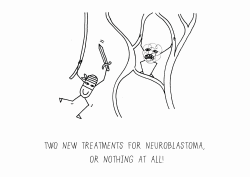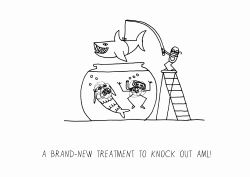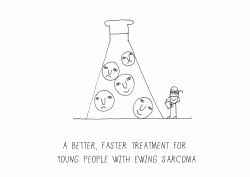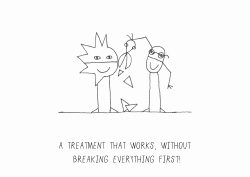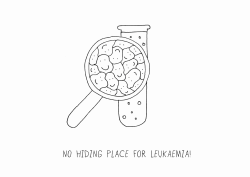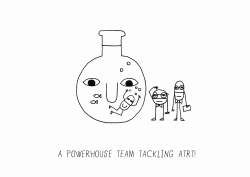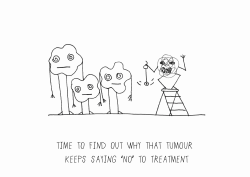FKC – Projects 2025
FIGHT KIDS CANCER (FKC) is a collaborative initiative by KickCancer (Belgium), Imagine for Margo (France), the Kriibskrank Kanner Foundation (Luxembourg), CRIS Cancer Foundation (Spain & United Kingdom), and KiKa (the Netherlands). Our goal is to promote the most innovative treatments through collaboration between academic researchers and the funding of research on paediatric cancer across European countries.
The 8 research projects described below have been selected by independent experts as part of our 2025 European call for projects.
It is thanks to the participation of 4,700 runners in RUN TO KICK 2025 that the following innovative projects were funded:
1/ ACHILLES/HR-NBL 2: two new treatments for neuroblastoma
The ACHILLES/HR-NBL 2 project is a clinical trial testing two new treatments for children with high-risk neuroblastoma: a combination of chemo and -immunotherapy (with Dinutuximab) and a targeted treatment (Lorlatinib) for patients with an “ALK” mutation. The trial aims to improve survival, personalise treatment, and evaluate the cognitive side effects (such as memory and attention issues) in young patients.
Type of study: Clinical trial
Disease: Neuroblastoma
2/ GD2-CART01_EU: a clinical trial for high-risk neuroblastoma
GD2-CART01_EU is a phase II clinical trial that aims at developing a new CAR-T cell therapy for children and teenagers with high-risk neuroblastoma. The study builds on a promising phase I trial. It will be rolled out in several centres across Europe with three key goals: improve survival, reduce the toxicity of existing treatments (such as stem cell transplant), and test early use of GD2-CART01 to pave the way for European approval and wider and thus easier access for children in Europe.
Type of study: Clinical trial
Disease: Neuroblastoma
3/ CARINA: a CAR-T therapy for acute myeloid leukaemia (AML)
The CARINA project is the first step toward a clinical trial designed to improve outcomes for children with relapsed Acute Myeloid Leukaemia (AML). Initially, the project will focus on developing a new CAR-T cell treatment that clears the cancer, to make a stem cell transplant possible.
Unlike traditional CAR-T cells (made from the patient’s own white blood cells), this new therapy will be produced “off the shelf” — a single batch for multiple patients — to save precious time. If this new method works, it can lead to quicker access to treatment, and this could be lifesaving for such an aggressive disease If the project leads to the development of CAR-T cells approved by the authorities, the team will be able to open a clinical trial for young patients with relapsed AML.
Type of study: Clinical trial
Disease: Acute myeloid leukaemia (AML)
4/ INTER-EWING 1: a better treatment for Ewing sarcoma
INTER-EWING 1 is a clinical trial aiming to improve the survival chances of children and teens with metastatic Ewing sarcoma. It tests a new strategy: adding a new treatment called regorafenib (a form of targeted therapy) right from the moment of diagnosis without waiting for relapse.
The study will also collect biological data to better understand the disease and why some patients respond to treatment and others don’t. And it includes a quality-of-life evaluation to assess how well young patients tolerate this treatment.
Type of study: Clinical trial
Disease: Ewing sarcoma
5/ INTER-B-NHL 2025: a less toxic treatment for B-cell non-Hodgkin lymphoma
INTER-B-NHL 2025 is a clinical trial aiming to reduce the treatment toxicity for children with B-cell non-Hodgkin lymphoma. The study will test whether some patients can safely receive a lower dose of chemotherapy, which is very aggressive, by replacing it with immunotherapy (rituximab), in order to lessen both short- and long-term side effects while maintaining therapeutic effectiveness. B-cell lymphomas already have high survival rates - but the price is a harsh and toxic treatment.
The focus is now on improving quality of life. Using genomic sequencing, across 300 participants, patients will be “stratified” into risk groups to personalize their treatment. The study will also evaluate how treatment impacts the patients’ well-being, using a digital quality-of-life tool.
Type of study: Clinical trial
Disease: B-cell non-Hodgkin’s lymphoma
6/ CRYSTAL-IMMUNE: enhancing immunotherapy to treat leukaemia
Crystal-Immune is a translational project aiming to improve immunotherapy for children with acute lymphoblastic leukaemia (ALL) that has spread to the cerebrospinal fluid — the protective fluid surrounding the brain. Immunotherapy and CAR-T cells (our white blood cells or our immune defence) have shown strong results against leukaemia, but they struggle to reach the cerebrospinal fluid effectively – which prevents patients from being cured.
Crystal-Immune seeks to understand why, and to develop ways to help immunotherapy break through this barrier, so harsh chemotherapy can be replaced with a gentler, more effective treatment.
Type of study: Translational research project
Disease: Lymphoblastic leukaemia
7/ EURATRT: gaining insight into rare rhabdoid tumours in children
Children diagnosed with ATRT (Atypical Teratoid Rhabdoid Tumours) at a very young age have a poor prognosis: only 40% respond to current treatment. Today, we still don’t understand why some children respond and others don’t. EURATRT is a translational project linked to the largest clinical trial for ATRT to date, giving researchers access to 300 tumour samples.
The goal is to better understand the biology of these tumours and adapt treatments to each child. The team combines expertise in paediatric oncology, neuropathology, molecular biology, genomics and data science. These experts will be working together to: predict treatment response, detect relapse earlier, and explore new therapeutic options, the aim is to personalise treatments and reduce side effects.
Type of study: Translational research project
Disease: Atypical Teratoid/Rhabdoid Tumour
8/ SIGBMRRI: looking for new therapies for gliomas and ependymomas
SIGBMRRI is a translational research project aiming to improve treatment for gliomas and ependymomas, two types of very aggressive brain tumours in children. By studying the micro-environment that surrounds the tumour, researchers hope to better understand how these cancers resist current therapies. This knowledge will help pave the way for the development of new treatments and boost survival for these young patients.
Type of study: Translational project
Disease: Gliomas & ependymomas
FKC – Projects 2025
- Financed: Target: €12 million, including €2,5 million from KickCancer
More than 85% of your donations go to financing research and supporting our advocacy work, less than 15% go to administration.
- Duration: 2 to 5 years
- Countries: AT, BE, CH, CY, DE, EL, ES, FR, HU, IE, IL, IT, NL, NO, PT, SE, SI, UK, (AU, CA, HK, JP, NZ)
- Disease: Neuroblastoma, AML, Ewing sarcoma, B-NHL, ALL, ATRT, glioma & ependymoma
- Status: To open
